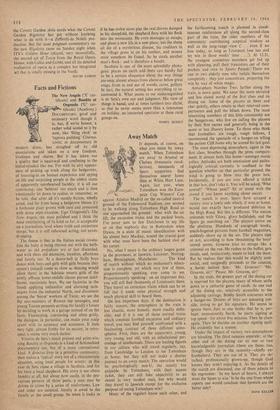Away Match
IT depends, of course, on what you mean by 'away match.' When Tottenham are away to Arsenal or Chelsea (traumatic recol- lection), thousands of Spurs supporters find themselves nearer home than at White Hart Lane.
Again, last year, when Tottenham won the Euro- / pean Cup Winners' Cup against Atletico Madrid on the so-called neutral ground of the Feijenoord Stadium, one seemed to be walking along Tottenham High Road as one approached the ground: what with the air lift, the excursion trains and the packed boats, I've never seen so few Dutchmen in my life as on that euphoric day in Rotterdam when Dyson, in a state of manic identification with his absent hero Mackay, scored the crucial goal with what must have been the luckiest shot of his career.
No, what I mean is the ordinary league game in the provinces, at Ipswich, Leicester, Notting- ham, Birmingham, Manchester. . . . The kind of match without which no enthusiast's educa- tion is complete, yet which very few' of them, proportionately speaking, ever come to see. Proportionately speaking: on an important day, you will still find thousands, of Londoners there. They travel on excursion trains which can be so full that it needs some physical strength and much physical skill to board them.
On less important days, if the destination is fairly remote, the atmosphere in the train is less chaotic, more homely, more readily defin- able; and if it- is one of those normal trains which combine football excursion and ordinary travel, you may find yourself confronted with a fascinating Contrast of three different atmo- spheres. First, there are the supporters, young, very young, and old, with an infinitesimal per- centage of intellectuals. There are leading figures in our culture who will travel regularly, say, from Cambridge to London to see Tottenham at home; but they will not make a shorter journey to an away match. The operation would be psychologically non-U, the inanity too palpable. In Tottenham, with their season ticket, they can still fake objectivity to an extent (a very modest one), but why would they travel to Ipswich except for the exclusive purpose of seeing Tottenham win?
Many of the regulars know each other, and the forthcoming match is planned in simul- taneous conferences all along the second-class part of the train, the older members of the community contributing sceptical wisdom as well as the long-range view ('. . . even if we lose today, so long as Liverpool lose too and we win in three weeks' time . .'). At 12.31, the youngest committee members get fed up with planning, pull their transistors out of their pockets and turn to Sports Parade. There are one or two elderly men who isolate themselves completely : they just concentrate, preparing the win by way of white magic.
Atmosphere Number Two, farther along the train, is more quiet. We enter the more elevated and less elated world of the first class and its dining car. Some of the players sit there and chat quietly, others return to their reserved com- partments and pull the blinds down. The most interesting members of this little community are the hangers-on, who live on calling the players by their first names and generally being in the more or less illusory know. To those who think that footballers are rough, tough fellows, I recommend the spectacle of a hanger-on telling the patient Cliff Jones why he scored his last goal.
The most depressing atmosphere, again in the first class, breathes through the press compart- ment. It almost feels like home—amongst music critics. Attitudes are both omniscient and patho- logically critical; curiosity is confined to the question whether on that particular ground, the wind is going to blow into the press box. Incidentally, if you are ever offered a ticket in that box, don't take it. You will be asked, 'Who scored?' Whose pass?' Sit or stand with the crowd if you know anything about soccer, The match is over. Spurs have scraped a victory over a lowly side which, if won at home, would not exactly have produced delirium in the High Road. But this is different. The station resounds with 'Glory, glory hallelujah, and the Spurs go marching on.' The players arrive on the platform. Hundreds of autograph books, much-fingered pictures from football magazines, suddenly shoot up in the air. The players sign or not, according to how threatening-the boys' crowd seems. Greaves tries to escape like a criminal on the run. He rushes to the buffet, gets inside, and, instinctively, wants to lock the door. But he realises that this would be slightly anti- social, and resignedly proceeds to the counter, a horde behind him : 'Mr. Greaves!"Mr. Greaves, sir!"Please, Mr. Greaves, sir!'
In the train, the greater part of the dining car is reserved for the players, many of whom settle dawn to a cathartic game of cards. At one end of the dining car, relatively accessible to the adjoining carriage, Bobby Smith converses with a hanger-on. Dozens of boys are queueing out- side, trying to get his signature. He seems to ignore them. Just as one thinks that he is, per- haps; unnecessarily harsh, he starts signing at top speed—for about five minutes. Then he chats again. Then he decides on another signing spell. He evidently has a system.
Under the impact of victory, two atmospheres are blending. The third remains separate: at the other end of the dining car sit one or two knowledgeable journalists (there are those, too, though they are in the minority—chiefly ex- footballers). They are out of it. They are de- tached, professionally grown-up, though God knows they aren't enjoying it. As the details of the match are discussed, one of them admits to his regression: 'In my heart of hearts, 1 always want the Spurs to win.' Is he the one from whose reports one would conclude that Ipswich are the better side?
HANS KELLER


































 Previous page
Previous page